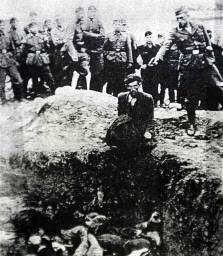Italy's highest court on Tuesday said that Germany must pay damages to the families of civilians killed by German soldiers in three Tuscan villages during WWII.
The Cassation Court upheld a 2007 appeals court ruling that Germany should pay 800,000 euros in compensation to the relatives of nine victims of the wartime massacre, which took placed in the towns of Civitella, Cornia and San Pancrazio.
Judges rejected Germany's claims that it was exempt from being held financially responsible for crimes committed by Nazi soldiers under accords drawn up in 1947 and 1961.
Augusto Dossena, representing Germany, had argued that other countries respected the immunity clauses contained in the accords and that if the Italian court failed to do so it ''would open a Pandora's box'' of uncertainty among the international community.
''The claims of these individuals would end up blocking the effects of the treaties,'' Dossena said.
A total of 203 people were shot dead in the towns on June 29, 1944 in retaliation for the murder of three German soldiers by Italian partisans.
The townspeople had initially fled their homes to avoid reprisals, but after assurances from German troops they returned to celebrate the festival of St Peter and St Paul.
Many were shot on sight, and women were also raped. Some of the bodies were disfigured.
The Cassation Court's ruling is the first time the court has ordered Germany to pay damages to victims of Nazi massacres in a criminal trial - in this case against former Nazi sergeant Max Josef Milde.
Milde, 88, was sentenced in absentia to life imprisonment by an Italian court in 2006 but lives at an undisclosed location in Germany.
In June the Cassation Court ruled that Germany must compensate some 50 Italian WWII deportees for the ill-treatment they suffered in Nazi labour camps.
The Cassation Court rejected the German government's plea for immunity from crimes committed against the deportees, many of them soldiers shipped off to Germany after Italy joined the Allies in September 1943.
The court said in its ruling that ''the Federal Republic of Germany has no right to be considered immune from the civil jurisdiction of Italian judges''.
A film by American director Spike Lee on another wartime atrocity in Tuscany opened in US cinemas last month.
Miracle At St Anna tells the story of four African-American soldiers in Italy in 1944 but also explores the infamous Nazi slaughter in Sant'Anna di Stazzema, where 560 villagers, including 116 children, were killed in another act of retaliation.










